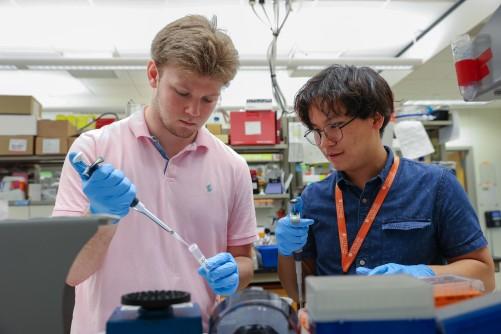
August 19, 2022 — Nicholas Lam was building a set in his performing arts high school’s scene shop when he began feeling a tingling, numbing sensation in his left arm.
Lam thought it felt similar to when his foot would “fall asleep” – except he wasn’t lying on his arm. He wondered if he pinched a nerve. Within the next 45 minutes, the muscle weakness began spreading to the entire left side of Lam’s body.
He ran up the staircase to the school nurse, who told Lam’s parents to bring him to the emergency room. On his way to the hospital, the 18-year-old’s speech started to slur, and the muscle weakness on his left side fully developed into hemiparesis, significantly limiting Lam’s ability to move that side of his body.
“The doctors found a 3-cubic centimeter-sized bleed in my right thalamus – a symmetrical, egg-shaped structure in the middle of the brain – and told me I had an intracerebral hemorrhage that caused a stroke,” Lam said. “The average age of onset for stroke is 65, so I was definitely out of the typical demographic.”
After recovering use of his left side and being discharged from the hospital five days later, and graduating high school the following month, Lam began researching all he could about the kind of stroke he had, wanting to find the best stroke specialists in Houston to help him understand the science behind his experience. Lam’s internet searches pointed him to Louise McCullough, MD, PhD, professor and the Roy M. and Phyllis Gough Huffington Distinguished Chair in the Department of Neurology with McGovern Medical School at UTHealth Houston and co-director of UTHealth Houston Neurosciences.
Lam saw that McCullough conducted much of her renowned research in the medical school’s Brain Rejuvenation Aging Inflammation Neurodegeneration Stroke (BRAINS) Research Laboratory, where more than 60 investigators, research scientists, fellows, assistants, and students study stroke, aging, inflammation, recovery, neurodegeneration, and sex differences in these areas. Lam was particularly interested in the BRAINS Lab’s Summer Research Program – an intensive 10-week program in which participants are paired with an experienced scientific mentor and assigned a research project. He cold-emailed program director Michael E. Maniskas, PhD, who allowed him to join this year’s cohort a few weeks late.
“When Nicholas first emailed, it was amazing to read his story and how far he had come since his stroke. After a virtual interview to discuss our research and gauge his interest in research, it was evident Nicholas belonged in the BRAINS Summer Program,” said Maniskas, research program manager in the Department of Neurology with McGovern Medical School. “While no specific project was set, Nicholas has had the opportunity to shadow almost every affiliated lab group within the BRAINS Research Lab, allowing him to get a broad overview of stroke research and the science behind each project.”
Over the past several weeks, Lam has shadowed Jack Monday, another recent high school graduate who is participating in the program for the second summer in a row, working under Maniskas.
“We are studying sex differences in the effects of ischemic stroke on middle-aged male and female mice,” said Monday, whose twin sister, Ellie Monday, is participating in a more clinical summer research program at the BRAINS Lab’s biobank. “Nicholas is helping me conduct behavior tests on the mice. From the data we’ve gathered so far, it looks like female mice will have more depressive symptoms, and perform better in behavior tests, following stroke.”
The program has allowed Monday to expand his research skill set, from working with animals to growing cell cultures in the lab and more. Eventually, he hopes to generate more specific questions related to sex differences in the relationship between stroke and cerebral amyloid angiopathy.
“There’s not really a typical day – I’m shadowing three separate projects, including Jack’s,” Lam said. “From day one, I was immediately thrust into work. In my first week here, I helped collect specimens and learned how to prepare them for cell analysis. With Jack’s project, I haven’t been cleared to touch the mice yet, but I get to observe how Jack performs functional behavioral testing with them and see how all the different machines work. High school just does not prepare you for this.”
Throughout the summer program, students attend a neurology seminar, Journal Club, Grand Rounds, and weekly lab meetings. Sessions are designed to teach the basics of neurology and introduce students to translational neuroscience research. At the end of the program, Monday and other participants will present their findings to the BRAINS Laboratory Research Team, which Lam is looking forward to observing.
“I would not be going into medicine had it not been for my stroke,” said Lam, who is majoring in theater at Northwestern University in Chicago this fall with plans to attend medical school afterward. “Being a stroke survivor stirred something in me. Going through the BRAINS Lab’s Summer Research Program also helped me understand that there is a myriad of factors that could’ve led to my stroke, and it’s gratifying in a way to see all the different causes and outcomes. It made me more passionate about health access and equity.”
Lam will likely see a familiar face in Chicago: Monday, who is attending the University of Chicago to pursue a bachelor’s degree in either psychology or neuroscience – or both. Long-term, Monday wants to obtain a PhD and continue researching the human brain.
“The BRAINS Lab has allowed me to ask so many questions and learn so much about the research process,” Monday said. “I still have many questions I want to answer regarding the brain, which I hope to do through my undergraduate research.”
For more information: https://www.uth.edu/


 February 03, 2026
February 03, 2026 









